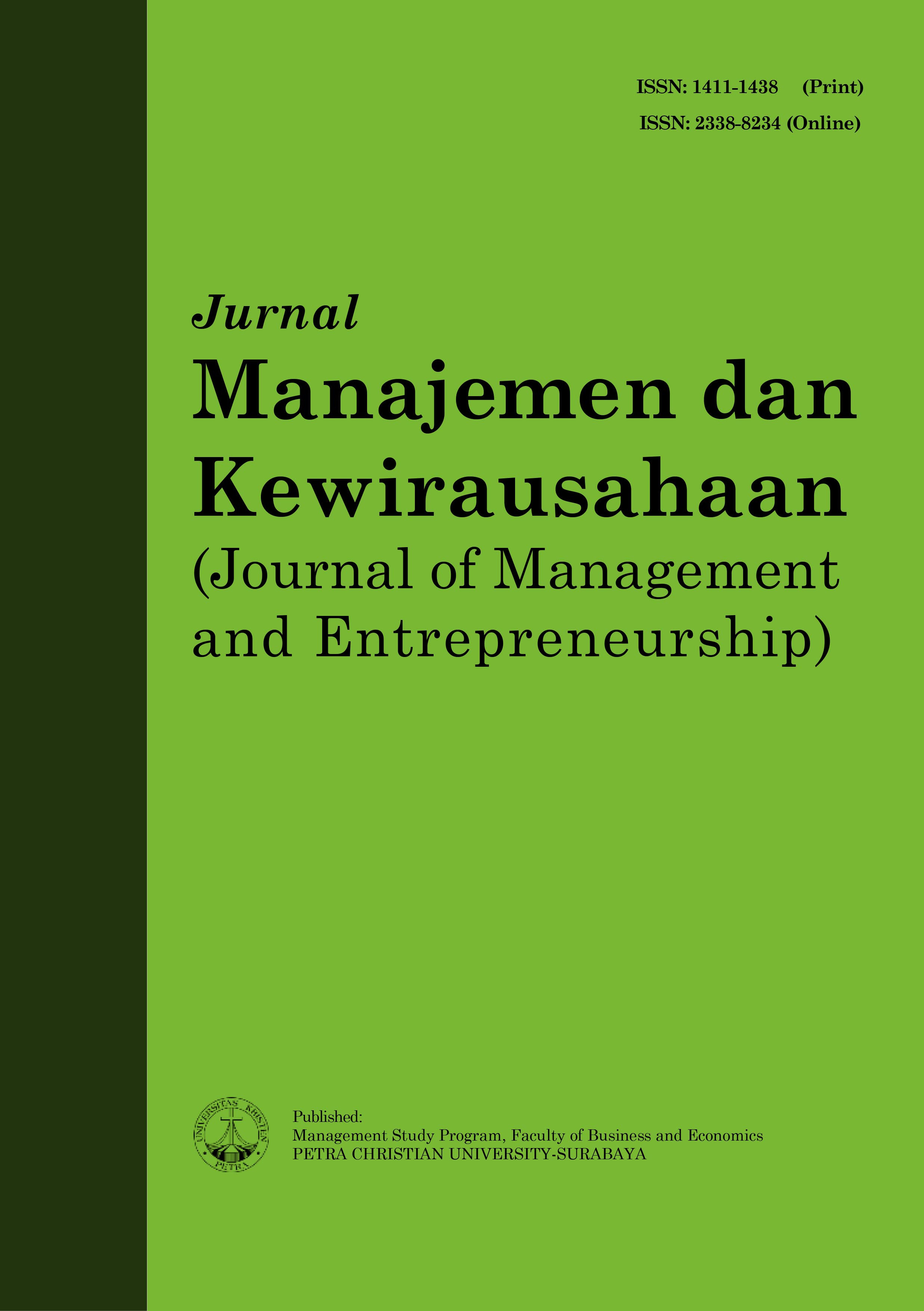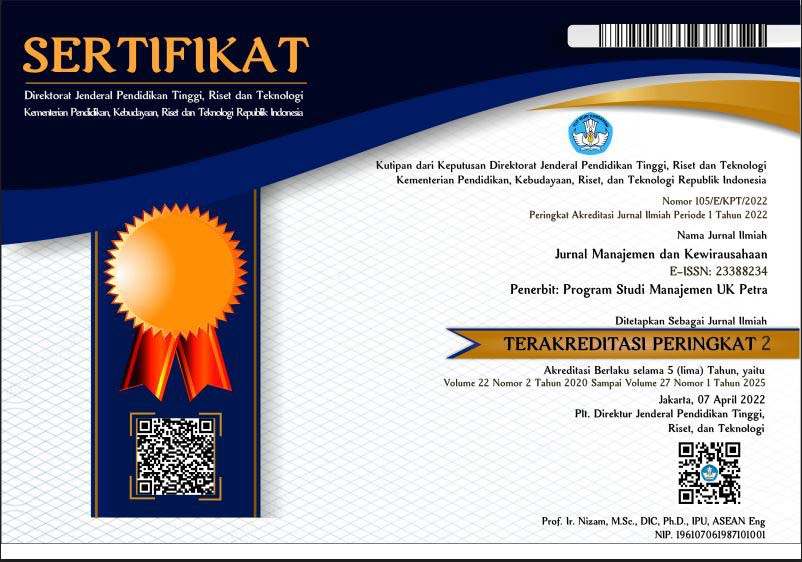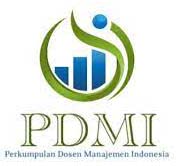THE EFFECT OF JOB PERFORMANCE THROUGH ORGANIZATIONAL CULTURE, WORK ENVIRONMENT, PERSONALITY, AND MOTIVATION
 :
:
https://doi.org/10.9744/jmk.22.2.87-98
Keywords:
Job performance, organizational culture, work environment, personality, motivation.Abstract
The dominant factor to achieve a school's competitiveness is the performance of headmasters. This study aimed to determine the direct and indirect influence of organizational culture, work environment, personality, and motivation on the performance of principal of state senior high schools. Research samples were 310 principals of state schools in Jakarta. Data analysis used a path analysis of which requirements were the test of normality, homogeneity, and linearity. The results of the research there were direct influence exogenous variables on endogenous, and there was indirect influence of personality through motivation on the job performance. Increased job performance could be done by coaching the headmaster about the culture, environment, and personalityReferences
Abdullah, I., Omar, R., & Rashid, Y. (2013). Effect of personality on organizational commitment and employees’ performance: Empirical evidence from banking sector of Pakistan. World Applied Sciences Journal, 27(1), 140–147. https://doi.org/10.5829/idosi.wasj.2013.27.01.1685
Ahmad, J., Razzaq, M., & Hussain, M. (2014). Impact of Big Five Personality Traits on Job Performance (Organizational Commitment As a Mediator). Management, Knowledge and Learning International Conference 2014, 1(2014), 571–577.
Al-Omari, K., & Okasheh, H. (2017). The influence of work environment on job performance: A case study of engineering company in Jordan. International Journal of Applied Engineering Research, 12(24), 15544–15550.
Araslı, H., Daşkın, M., & Saydam, S. (2014). Polychronicity and Intrinsic Motivation as Dispositional Determinants on Hotel Frontline Employees’ Job Satisfaction: Do Control Variables Make a Difference? Procedia - Social and Behavioral Sciences, 109(2014), 1395–1405. https://doi.org/10.1016/j.sbspro.2013.12.643
Berková, K., & Krejčová, K. (2016). Effect of Teachers’ Abilities on Students’ Motivation with Varying Levels of Intellectual Abilities in the Economics. ERIES Journal, 9(3), 1712–1713. https://doi.org/10.7160/eriesj.2016.090304.Introduction
Borys, D. (2014). Organisational Culture. In Socio-Technical Knowledge Management. https://doi.org/10.4018/9781599045498.ch017
Cacioppo, J. T., & Petty, R. E. (1982). The Need for Cognition. Journal of Personality and Social Psychology, 42(1), 116–131. https://doi.org/10.1080/13183222.2018.1418978
Chapman, B. P., Roberts, B., & Duberstein, P. (2011). Personality and longevity: Knowns, unknowns, and implications for public health and personalized medicine. Journal of Aging Research, 2011. https://doi.org/10.4061/2011/759170
Colquitt, J. A., LePine, J. A., & Wesson, M. J. (2019). Organizational behavior: Improving performance and commitment in the workplace. In -.
Copuš, L., Šajgalíková, H., & Wojčák, E. (2019). Organizational Culture and its Motivational Potential in Manufacturing Industry: Subculture Perspective. Procedia Manufacturing, 32(2019), 360–367. https://doi.org/10.1016/j.promfg.2019.02.226
Dhani, P. (2017). Personality and Job Performance. Kaav International Journal of Economic, 4(2), 177–183. https://doi.org/10.1207/s15327043hup1102&3_1
Eide, A. E., Saether, E. A., & Aspelund, A. (2020). An investigation of leaders’ motivation, intellectual leadership, and sustainability strategy in relation to Norwegian manufacturers’ performance. Journal of Cleaner Production, 254(2020), 120053. https://doi.org/10.1016/j.jclepro.2020.120053
Eliyana, A., Ma’arif, S., & Muzakki. (2019). Job satisfaction and organizational commitment effect in the transformational leadership towards employee performance. European Research on Management and Business Economics, 25(3), 144–150. https://doi.org/10.1016/j.iedeen.2019.05.001
Fandiño, F. G. E., Muñoz, L. D., & Velandia, A. J. S. (2019). Motivation and E-Learning English as a foreign language: A qualitative study. Heliyon, 5(9). https://doi.org/10.1016/j.heliyon.2019.e02394
Farhan, B. Y. (2018). Application of path-goal leadership theory and learning theory in a learning organization. Journal of Applied Business Research, 34(1), 13–22. https://doi.org/10.19030/jabr.v34i1.10088
Farooqui, M. S., & Nagendra, A. (2014). The Impact of Person Organization Fit on Job Satisfaction and Performance of the Employees. Procedia Economics and Finance, 11(14), 122–129. https://doi.org/10.1016/s2212-5671(14)00182-8
Fayol, H., & Storrs, C. (1954). General and Industrial Mangaement (p. 110). p. 110. Retrieved from https://ia801600.us.archive.org/4/items/in.ernet.dli.2015.13518/2015.13518.General-And-Industrial-Management.pdf
Gagné, M., & Deci, E. L. (2005). Self-determination theory and work motivation. Journal of Organizational Behavior, 26(4), 331–362. https://doi.org/10.1002/job.322
Ghani, N. M. A., Yunus, N. S. N. M., & Bahry, N. S. (2016). Leader’s Personality Traits and Employees Job Performance in Public Sector, Putrajaya. Procedia Economics and Finance, 37(16), 46–51. https://doi.org/10.1016/s2212-5671(16)30091-0
Gibson, J. L., Ivancevich, J. M., James H. Donnelly, J., & Robert, K. (2012). Organization: Behavior Structure Processes (New York:; N. Y. McGraw-Hill, Ed.). Retrieved from http://dl.motamem.org/organizations_behavior_structure.pdf
Hanaysha, J. (2016). Testing the Effects of Employee Engagement, Work Environment, and Organizational Learning on Organizational Commitment. Procedia - Social and Behavioral Sciences, 229(2016), 289–297. https://doi.org/10.1016/j.sbspro.2016.07.139
Hayati, K., & Caniago, I. (2012). Islamic Work Ethic: The Role of Intrinsic Motivation, Job Satisfaction, Organizational Commitment and Job Performance. Procedia - Social and Behavioral Sciences, 65(ICIBSoS), 272–277. https://doi.org/10.1016/j.sbspro.2012.11.122
Hober, B., Schaarschmidt, M., & von Korflesch, H. (2019). Internal idea contests: Work environment perceptions and the moderating role of power distance. Journal of Innovation and Knowledge, 30(2019), 1–10. https://doi.org/10.1016/j.jik.2019.11.003
Indrasari, M. (2017). The Effect of Organizational Culture , Environmental Work , Leadership Style on The Job Satisfaction And Its Impact On The Performance. Sinergi, 7(2017), 58–73.
Ingsiyah, H., Haribowo, P., & Nurkhayati, I. (2019). Effect of working environment on employee motivation at Pt. Pupuk Sriwidjaja Palembang, Pusri Central Java regional Marketing. Admisi Dan Bisnis, 20(1), 83. https://doi.org/10.32497/ab.v20i1.1428
Isa, M. F. M., Ugheoke, S. O., & Noor, W. S. W. M. (2016). The Influence of Organizational Culture on Employees’ Performance: Evidence from Oman. Journal of Entrepreneurship and Business, 4(2), 1–12. https://doi.org/10.17687/jeb.0402.01
Jain, R., & Kaur, S. (2014). IMPACT OF WORK ENVIRONMENT ON JOB. International Journal of Scientific and Research Publucation, 4(1), 1–8.
Janićijević, N., Nikčević, G., & Vasić, V. (2018). The influence of organizational culture on job satisfaction. Economic Annals, 63(219), 83–114. https://doi.org/10.2298/EKA1819083J
Jasiyah, R., Ramli, H. M., Sinring, H. B., & Sukmawati, S. (2018). The effect of ability and motivation on job satisfaction and employee performance. Archives of Business Research, 6(12), 12–23. https://doi.org/10.14738/abr.612.5644
Judge, T. A., & Ilies, R. (2002). Relationship of personality to performance motivation: A meta-analytic review. Journal of Applied Psychology, 87(4), 797–807. https://doi.org/10.1037/0021-9010.87.4.797
Lankeshwara, P. (2016). A study on the impact of workplace environment on employee’s performance: with reference to the Brandix Intimate Apparel - Awissawella. International Journal of Multidisciplinary Studies, 3(1), 47. https://doi.org/10.4038/ijms.v3i1.82
Latif, M. S., Mushtaq, A., Muhammad, Q., Ferdoos, A., & Hummayoun, N. (2013). Impact of employee ’ s job satisfaction on organizational performance . European Journal of Business and Management, 5(5), 166–171.
Ljubin-Golub, T., Petričević, E., & Rovan, D. (2019). The role of personality in motivational regulation and academic procrastination. Educational Psychology, 39(4), 550–568. https://doi.org/10.1080/01443410.2018.1537479
Maamari, B. E., & Saheb, A. (2018). How organizational culture and leadership style affect employees’ performance of genders. International Journal of Organizational Analysis, 26(4), 630–651. https://doi.org/10.1108/IJOA-04-2017-1151
Mextaria, Y., Sukmawati, A., & Hubeis, A. V. S. (2019). The Evaluation of Lecturer’s Performance and Sekolah Tinggi Perikanan’s Performance Through Intellectual Capital. Jurnal Manajemen, 23(1), 19. https://doi.org/10.24912/jm.v23i1.442
Mohammad, Z. (2017). The Effect Of Organizational Culture And Working Environment On Employee Performance: Study On The Example Of Printing Company. RJOAS, 12(December), 81–85.
Nai, H., & Wiwik, W. (2018). The Implementation Of Duties And Functions Of State High School Principals. Jurnal Akuntabilitas Manajemen Pendidikan, 6(2), 183–192.
Najam us Sahar, J. (2016). Impact of Personality Type on Job Productivity. Journal of Hotel & Business Management, 5(1), 1–9. https://doi.org/10.4172/2169-0286.1000119
Nam, Y., & Kim, H. (2016). A Study on the Effect of Industry Organizational Culture on Job Attitude of Organizational Employees - Comparison between the Semiconductor and the Automobile Industries. Procedia Computer Science, 91(Itqm), 581–590. https://doi.org/10.1016/j.procs.2016.07.149
Narasuci, W., Margono, S., & Noermijati, N. (2018). Effect of Work Environment on Lecturer Performance Mediated By Work Motivation and Job Satisfaction. Jurnal Aplikasi Manajemen, 16(4), 645–653. https://doi.org/10.21776/ub.jam.2018.016.04.11
Nuckcheddy, A. (2018). The Effect of Personality on Motivation and Organisational Behaviour. Psychology and Behavioral Science International Journal, 9(2). https://doi.org/10.19080/pbsij.2018.09.555760
Nwakoby, N. P., Okoye, J. F., & Anugwu, C. C. (2019). Effect of Organizational Culture on Employee Performance in Selected Deposit Money Banks in Enugu State. Journal of Economics and Business, 2(4). https://doi.org/10.31014/aior.1992.02.04.162
Ogunnaike, O. O., Akinbola, O. A., & Ojo, O. A. (2014). Effect of Motivation on Job Satisfaction of Selected Sales Representatives. Journal of Educational and Social Research, 4(1), 197–203. https://doi.org/10.5901/jesr.2014.v4n1p197
Paschal, A. O., & Nizam, D. I. (2016). Effects of Organisational Culture on Employees Performance: International Journal of Accounting and Business Management, 4(1), 19–26. https://doi.org/10.24924/ijabm/2016.04/v4.iss1/19.26
Permendikbud Nomor 6. Tugas dan Fungsi Kepala Sekolah. , Pub. L. No. 6 tahun 2018, 15 (2018).
Prakoso, R. (2014). Environmental Impact Of Work Motivation And Employee Performance PT. AXA Financial Indonesia Cabang Malang. Jurnal Administrasi Bisnis S1 Universitas Brawijaya, 14(2), 1–10.
Raziq, A., & Maulabakhsh, R. (2015). Impact of Working Environment on Job Satisfaction. Procedia Economics and Finance. https://doi.org/10.1016/s2212-5671(15)00524-9
Riduwan, R. (2011). Path Analysis (Analisis jalur). Retrieved from bandung: Alfabeta
Saad, G. Ben, & Abbas, M. (2018). The impact of organizational culture on job performance: A study of Saudi Arabian public sector work culture. Problems and Perspectives in Management, 16(3), 207–218. https://doi.org/10.21511/ppm.16(3).2018.17
Safaria, T., Tentama, F., & Hadi, S. (2016). Cyberbully , Cybervictim , and Personality Profile among Indonesian Junior High School Students. The Turkish Online Journal of Educational Technology, 15(3), 40–48.
Salgado, J. F. (2017). Moderator effects of job complexity on the validity of forced-choice personality inventories for predicting job performance. Revista de Psicologia Del Trabajo y de Las Organizaciones, 33(3), 229–238. https://doi.org/10.1016/j.rpto.2017.07.001
Samson, G. N., Waiganjo, M., & Koima, J. (2015). Effect of Workplace Environment on the Performance of Commercial Banks Employees in Nakuru Town. International Journal of Managerial Studies and Research (IJMSR), 3(12), 76–89. Retrieved from www.arcjournals.org
Singh, K. (2016). Influence of Internal Service Quality on Job Performance: A Case Study of Royal Police Department. Procedia - Social and Behavioral Sciences, 224(August 2015), 28–34. https://doi.org/10.1016/j.sbspro.2016.05.396
Teo, S. T. T., Bentley, T., & Nguyen, D. (2019). Psychosocial work environment, work engagement, and employee commitment: A moderated, mediation model. International Journal of Hospitality Management, (November), 102415. https://doi.org/10.1016/j.ijhm.2019.102415
Thiruvarasi, M., & Kamaraj, M. (2017). Influence og Big Five Personality on Organizasional Commitment, emitional Intelligence and Job Satisfaction. In Asia Pacific Journal of Research in Business Management (Vol. 8). https://doi.org/10.1016/j.jenvman.2018.01.013
Virgana, V. (2018). The Increasing Performance of School Principal through Remuneration, Personality, and Job Satisfaction. International Journal of Human Capital Management, 2(2), 45–59.
Weerasinghe, G. (2017). Organization culture impacts on employee motivation : A case study on an apparel company in Sri Lanka. International Journal of Multidisciplinary Research and Development, 4(4), 59–62.
Zlate, S., & Cucui, G. (2015). Motivation and Performance in Higher Education. Procedia - Social and Behavioral Sciences, 180(November 2014), 468–476. https://doi.org/10.1016/j.sbspro.2015.02.146
Downloads
Published
Versions
- 2021-02-02 (2)
- 2020-09-01 (1)
How to Cite
Issue
Section
License
Authors who publish on this journal agree to the following terms:
- Authors retain copyright and grant the journal right of first publication with the work simultaneously licensed under a Creative Commons Attribution License that allows others to share the work with an acknowledgement of the work's authorship and initial publication in this journal.
- Authors are able to enter into separate, additional contractual arrangements for the non-exclusive distribution of the journal's published version of the work (e.g., post it to an institutional repository or publish it in a book), with an acknowledgement of its initial publication in this journal.
- Authors are permitted and encouraged to post their work online (e.g., in institutional repositories or on their website) prior to and during the submission process, as it can lead to productive exchanges, as well as earlier and greater citation of published work (See The Effect of Open Access).


















